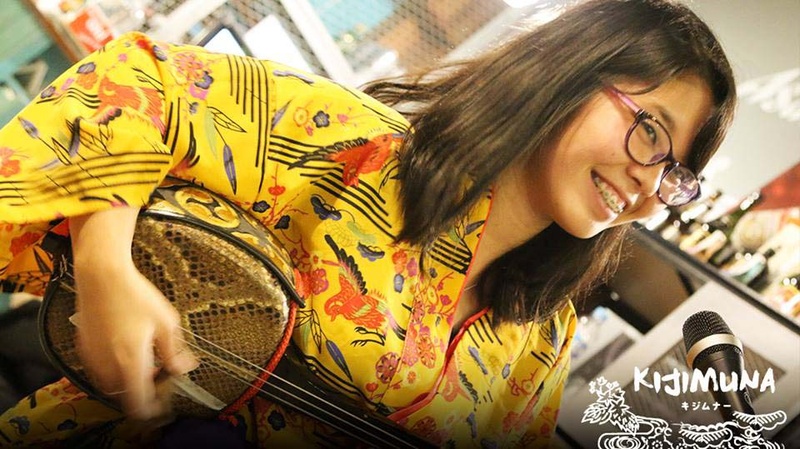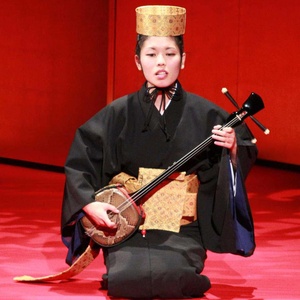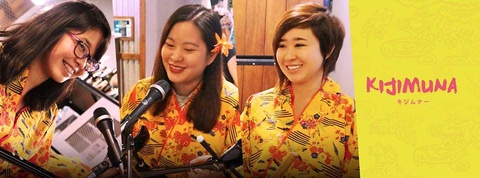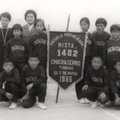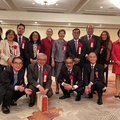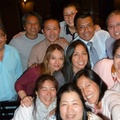The silence shocked him. I had never experienced anything like this before. Accustomed to the hustle and bustle of Lima, Okinawa seemed like a parallel reality from which the volume had been removed. Miyuki Arakaki felt like something was missing. I missed the hustle and bustle.
If in one sense Okinawa was another world, silent and imperturbable, in another it was like her home, the land of her grandparents, of the obaachan who sang songs to her in uchinaguchi when she was a girl, of the music she had performed since she was 15 in the Haisai Uchina group with other Nikkei of Okinawan origin like her, from her inseparable sanshin that she turned into an extension of her body.
Miyuki came to Okinawa in 2012 thanks to a prefectural scholarship to study Okinawan classical music, with a specialty in sanshin, at the Okinawa Prefectural University of the Arts. It was a year-long experience that transformed her life and brought her closer to her roots.
It was difficult at first. He was in Japan for the first time, he didn't know anyone and his nihongo was not very fluent. She had to fend for herself. A year later he was completely independent and his nihongo had improved a lot.
Was lucky. Her teachers were patient with her and her fellow students welcomed her with open arms. If she didn't understand something, they helped her. A Brazilian, also a scholarship recipient, and she were the only foreigners in a class of 20 students. Curiously, although she introduced herself as Miyuki, her classmates preferred to call her Jesica, attracted by the exotic resonances of her foreign name.
Although Miyuki was familiar with sanshin and Okinawan folk songs, in Okinawa she immersed herself in another type of music, koten, typical of the nobility in ancient times, when the prefecture was an independent kingdom.
It was a great challenge for her to adapt to the koten. Popular music – he explains – you can interpret it by ear, “as your heart tells you”, introduce arrangements, in short, adapt it to you. Instead, the koten has a score for music and voice, a rigid framework from which you cannot escape.
Miyuki didn't just learn music. Each song contained a story, love stories or misfortunes, and referred to a time, a way of life, an idiosyncrasy. His sensei taught him the content of each piece of music and its context.
That a girl who came from the other side of the world studied her music caught the attention of people in Okinawa, and even encouraged some young Okinawans, not very attached to their culture, to become more interested in it.
Miyuki also learned history. He visited the Himeyuri Peace Museum, where he deepened his knowledge of the suffering of Okinawa during World War II and heard first-hand testimonies from survivors. It was a shocking experience, but necessary to know the truth.
Living in Okinawa also allowed him to immerse himself in a topic he did not know well: the controversy over the presence of US military bases in the prefecture. There she became aware of the importance of the problem and to this day she remains informed about everything that is happening.
Before traveling to Okinawa, this was essentially the land of his ancestors. Now it is also their land. What affects Okinawa also affects her.
UCHINA LESSONS
The silence that surprised Miyuki when she first arrived in Okinawa is consistent with the lifestyle she discovered in Uchina and learned to enjoy. Although he lived in Naha, the capital, life was placid.
He remembers that the city was very quiet, the monorail was almost empty and he found very few people on the street. The people were friendly, carefree, relaxed and smiled permanently, as if they had a smile tattooed on their face. “You feel at home, it is not difficult to adapt to Okinawa.”
In Okinawa, permeated by the spirit of its inhabitants, Miyuki was carefree. “I was sure I was going to cross the street and they weren't going to hit me,” she remembers. She went for a run in the early morning knowing that she would return to her apartment unharmed. Nothing to do with Lima, where you have to always be alert, taking extreme precautions, not only because of crime, but also because of the maddening traffic.
Although Miyuki knew the culture of Okinawa since she was little from her parents and grandparents, and later from her experience in Haisai Uchina, being in Okinawa, experiencing it all in situ, was like entering another dimension. “It makes you fall more in love with the culture and that's why you want to promote it.”
Okinawa left him several lessons. Accustomed to procrastinating in Peru, there she learned to pursue all the opportunities that were presented to her, to do everything today, not tomorrow. Aware that I only had one year of scholarship, I knew that if I didn't do things now, I might not have a second chance.
Furthermore, living abroad, meeting people from different continents, expanded his vision of the world and taught him to be tolerant. “Okinawa shapes you a lot as a person. It makes you mature, but it's also fun,” he says. “It was a very enriching experience, I always recommend (young people) to go. The love for the land of your ojiis and obaas grows.”
THANKS TO DAD
The sanshin came into Miyuki's life through paternal imposition. At the request of his father, an uncle who resides in Japan brought him a sanshin to Peru. Until then she had never touched one. To help her learn, her father encouraged her to join the Okinawan music group Haisai Uchina and take lessons in their rehearsals.
At first, he admits, he liked the group more for the friends he was beginning to make, for the atmosphere of camaraderie, than for the music. Little by little, however, he began to be seduced by music and recognized in the songs they performed the songs that his obaachan sang to him. He also discovered their meaning and the history that surrounded them.
When Miyuki jumped from rehearsals to the stage to perform with the group at Nikkei community events, she discovered something fascinating: the connection with people. The majority of his audience were ojiichan and obaachan .
“The cool thing was that they sang (the songs) with us, they got excited. It was something I had never experienced. “I thought it was a really cool feeling,” he says. He remembers that they always told him: “When you sing you have to look them in the eyes, you have to transmit the song to them, not just memorize and sing.” Teaching that he remembers and applies to this day.
The experience in Haisai Uchina and the communion with the Issei encouraged her to apply for the scholarship.
NEW GROUP, NEW CHALLENGE
Music continues to occupy a large part of Miyuki's life. Having just turned 27, she continues in Haisai Uchina (although the band is not as active as before due to the multiple occupations of its members), and recently formed a new group, Kijimuna, with two friends, Lucy Tobaru and Kaori Matzumura. , who also plays Okinawan music. Additionally, he is a member of a rock band.
With Kijimuna he faces a greater challenge. Previously, the audience it addressed belonged to the Nikkei community. Now, although she performs in a Japanese restaurant, her audience is broader, not necessarily versed in Okinawan music, which is why she and her colleagues have to redouble their efforts to catch their interest. They have already won over the collective public, they have to win over the other.
The task of the Kijimuna girls is not only musical, but also educational and cultural promotion. In addition to singing, they explain the meaning of the songs they perform and enlighten the audience about Okinawan customs and culture. They also interact with customers, do trivia, and even make them dance. With music and dance, they put Okinawa in their hearts.
© 2016 Enrique Higa


